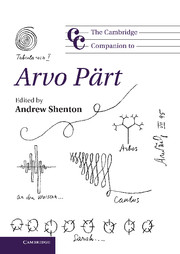Book contents
- Frontmatter
- 1 Introduction: the essential and phenomenal Arvo Pärt
- 2 A narrow path to the truth: Arvo Pärt and the 1960s and 1970s in Soviet Estonia
- 3 Perspectives on Arvo Pärt after 1980
- 4 Musical archetypes: the basic elements of the tintinnabuli style
- 5 Analyzing Pärt
- 6 Arvo Pärt: in his own words
- 7 Bells as inspiration for tintinnabulation
- 8 Arvo Pärt and spirituality
- 9 The minimalism of Arvo Pärt: an ‘antidote’ to modernism and multiplicity?
- 10 Arvo Pärt in the marketplace
- Appendix A Radiating from silence: the works of Arvo Pärt seen through a musician's eyes
- Appendix B Greatly sensitive: Alfred Schnittke in Tallinn
- Appendix C Remembering Heino Eller
- Appendix D Acceptance speech for the International Bridge Prize of the European City of Görlitz
- Appendix E Acceptance speech for the Léonie Sonning Music Prize 2008
- Appendix F Works list
- Notes
- Select bibliography
- Cambridge Companions to Music
- Index
Appendix D - Acceptance speech for the International Bridge Prize of the European City of Görlitz
Published online by Cambridge University Press: 28 September 2012
- Frontmatter
- 1 Introduction: the essential and phenomenal Arvo Pärt
- 2 A narrow path to the truth: Arvo Pärt and the 1960s and 1970s in Soviet Estonia
- 3 Perspectives on Arvo Pärt after 1980
- 4 Musical archetypes: the basic elements of the tintinnabuli style
- 5 Analyzing Pärt
- 6 Arvo Pärt: in his own words
- 7 Bells as inspiration for tintinnabulation
- 8 Arvo Pärt and spirituality
- 9 The minimalism of Arvo Pärt: an ‘antidote’ to modernism and multiplicity?
- 10 Arvo Pärt in the marketplace
- Appendix A Radiating from silence: the works of Arvo Pärt seen through a musician's eyes
- Appendix B Greatly sensitive: Alfred Schnittke in Tallinn
- Appendix C Remembering Heino Eller
- Appendix D Acceptance speech for the International Bridge Prize of the European City of Görlitz
- Appendix E Acceptance speech for the Léonie Sonning Music Prize 2008
- Appendix F Works list
- Notes
- Select bibliography
- Cambridge Companions to Music
- Index
Summary
November 9, 2007, in Görlitz, Germany
Dear honored guests, dear friends,
To be the center of attention for politicians and scientists is an unusual affair for a musician. Today, I hear words about my music and myself which sound rather excessive to me, as the goals I have set for myself were never as grandiose as they were stated here. My goals and standards were and are much more modest and simple. Back then, when what is today considered my music was just coming into being, I had my hands full with making sure to get myself going and solve my own problems. I had to get to a state where I could find a musical language that I wanted to live with. I was searching for a small island of sound, for a ‘place’ inside me, where – let's call it – a dialogue with God might occur. To find this place was a vital task for me. I am sure that this kind of desire is a part of every human being, whether consciously or unconsciously, and maybe many of you know that and realize what it is I am talking about.
To clarify my thoughts I would like to describe a picture for you: if we look at some sort of substance or object through a scanning, tunneling microscope, the thousandfold enlargement obviously looks different than the millionfold one. If one moves through the different states of enlargement, one can discover hitherto unimaginable and fairly chaotic ‘landscapes’ in every material. At one point, however, there is a limit, at just about three-millionfold enlargement. There, the curious landscapes have disappeared and all we see is a strict geometry, a kind of net that is very clear and very specific.
- Type
- Chapter
- Information
- The Cambridge Companion to Arvo Pärt , pp. 200 - 201Publisher: Cambridge University PressPrint publication year: 2012



